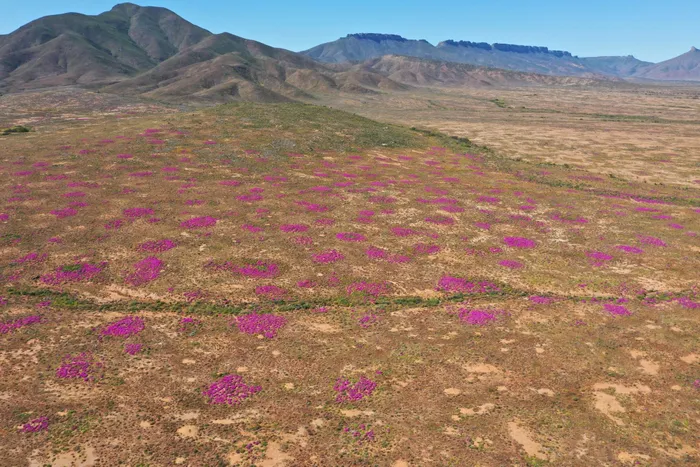Concerns escalate over Vaalputs nuclear waste facility upgrade's impact on agriculture
AGRICULTURE

There has been concern raised about the possible upgrade of the Vaalputs nuclear waste storage facility in the Northern Cape
Image: File: PROFESSOR ALASTAIR POTTS
The potential upgrade of the Vaalputs nuclear waste storage facility in the Northern Cape has triggered alarm bells among agricultural stakeholders.
The farming association TLU SA expressed deep concerns about the implications this development may have on the agriculture sector, an industry vital to the region's economy and food security.
The urgency of clear and transparent communication regarding this upgrade has been underscored as local communities grapple with uncertainty surrounding the proposed changes.
Recent reports highlighted that the National Radioactive Waste Disposal Institute (NRWDI) is advancing design plans to develop a Centralised Interim Storage Facility (CISF) for long-term storage of spent nuclear fuel from Koeberg Power Station, set to commence in 2030.
Riedewaan Bakardien, CEO of NRWDI, presented this update during a session with the Parliamentary Portfolio Committee on Electricity and Energy, igniting further anxiety among farmers and landowners in the region.
Jan Palm, Chairperson of TLU SA Northern Cape, said on Friday the planned upgrade and potential expansion of the Vaalputs nuclear waste storage facility was significant.
Palm said the Vaalputs area lied in a region that was becoming increasingly important for sustainable livestock farming and dryland crop production.
“This development has far-reaching implications for organised agriculture, local communities, and food security in Namaqualand and the broader Northern Cape,” he said.
“Any contamination—whether current or potential—of soil, air, or water sources poses a direct threat to the safety and market acceptance of food products from this region.”
The unique ecosystem in Namaqualand, a prominent tourist destination celebrated for its biodiversity, is particularly vulnerable.
Beyond environmental concerns, Palm indicated that the presence of a nuclear waste facility could dampen future agricultural development, deter tourism investment, and reduce land values, thereby undermining job creation and economic growth within the region
“Expanding the facility increases the risk of long-term environmental damage—something that cannot easily be reversed. We are concerned about the extent to which local stakeholders have been included in decision-making processes,” Palm said.
Professor Hartmut Winkler from the University of Johannesburg pointed out that the issue of radioactive waste disposal has long plagued the nuclear energy sector, with adverse implications for health and environmental safety.
“In essence, the process of generating nuclear power in a plant like Koeberg also results in many radioactive byproducts, some of which stay radioactive, and thus dangerous to human and other life forms, for several years. The long-term plan then typically amounts to collecting, shielding, and burying the radioactive material," he said.
Winkler added that such a location would have to be as safe as possible from anything that might damage the store and result in the radioactive material seeping into the environment.
He said if high concentrations of radioactive isotopes get into the groundwater, that can result in the water supplies of an entire region becoming unusable for consumption and agricultural purposes.
"For that reason, nobody wants a radioactive waste disposal site in their neighbourhood, hence the concerns of the Namaqualand farmers, which is where the Vaalputs site is located. The storage of waste from existing and decommissioned nuclear plants is an international problem, with major civic protests at many previously identified long-term storage sites," he said.
“Upgrading Vaalputs will be expensive, so would other options like trying to ship it out of the country. Keeping everything at Koeberg does no longer seem to be an option. I expect a lot of turbulence around this issue in the years to come.”
Princess Mthombeni, a nuclear communications specialist and founder of Africa4Nuclear, said that globally, radioactive waste facilities have long coexisted with productive agricultural regions without undermining food security or environmental safety.
“The Vaalputs facility in South Africa is no exception, operating within a region increasingly vital for sustainable livestock and dryland crop farming,” she said.
Mthombeni added that in South Africa, nuclear waste management is governed by one of the most comprehensive and purpose-built frameworks in the energy sector.
“The Radioactive Waste Management Policy and Strategy of 2005 sets the foundation for safe, transparent, and sustainable practices. Oversight by the National Nuclear Regulator (NNR) and the NRWDI ensures that stringent environmental standards are upheld, supporting the continued coexistence of nuclear infrastructure and agriculture.”
BUSINESS REPORT